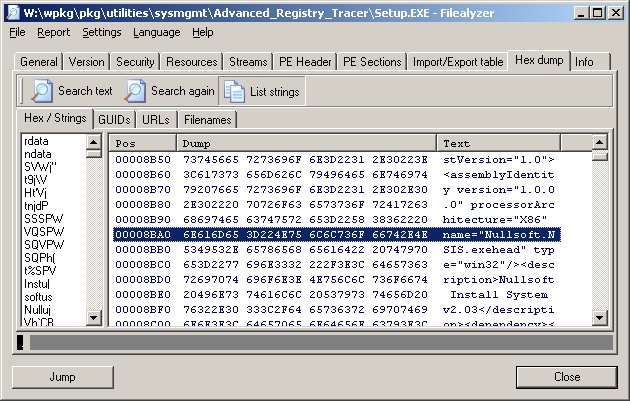Installation of Advanced Registry Tracer (ART) with wpkg
I wanted to configure
wpkg for a silent
install of
Advanced Registry
Tracer (ART) from
Elcomsoft.
ART is a utility designed for analyzing changes made to the Windows Registry.
I couldn't find any information on the developer's site or elsewhere on
configuring it for a silent installation, so I looked at the setup.exe file with
FileAlyzer.
When I listed strings in the file, I saw "Nullsoft" and "NSIS", so I
knew it used the Nullsoft Scriptable Install System (NSIS).

That installer normally allows you to perform a silent install
with the "/s" option and to specify the installation directory with the
"/D=dir" option. So I put the following lines in the
wpkg packages.xml file to install the software in
"C:\Program Files\Utilities\SysMgmt\ART"
<package
id="ART"
name="Advanced Registry Tracer"
revision="1"
reboot="false"
priority="1">
<check type="uninstall" condition="exists" path="Advanced Registry Tracer" />
<install cmd='\\server\wpkg\pkg\utilities\sysmgmt\advanced_registry_tracer\setup.exe
/S /D=%PROGRAMFILES%\Utilities\SysMgmt\ART'>
<exit code="0" />
</install>
<remove cmd='"%PROGRAMFILES%\Utilities\SysMgmt\ART\uninstall.exe" /S' />
</package>
References:
-
Unattended, A Windows deployment system: Unattended/Silent Installation
Switches for Windows Apps
[/os/windows/software/wpkg]
permanent link
BASH Variables
Some useful variables available in the
BASH shell.
- $$ = The PID number of the process executing the shell.
- $? = Exit status variable.
- $0 = The name of the command you used to call a program.
- $1 = The first argument on the command line.
- $2 = The second argument on the command line.
- $n = The nth argument on the command line.
- $* = All the arguments on the command line.
- $# The number of command line arguments.
Example:
#!/bin/bash
if [ $# -eq 0 ]
then
echo "Usage: $0 filename"
else
wc -l $1
fi
The script first checks for whether any argument has been entered on the
command line, i.e. whether $# equals zero. If no arguments are present
on the command line, the script prints a usage message. The $0 variable
holds the name of the script itself. If an argument is entered on the
command line, it is presumed to be a filename and the wc command is called
to count the number of lines in the file.
So, if the script is named "example", and is called without any options,
then the following output would be printed.
# ./example
Usage: ./example filename
If a filename is entered on the command line and that file has 21 lines in
it, the following would be printed.
# ./example sample.txt
21 sample.txt
References:
-
Linux Shell Programming
[/os/unix/bash]
permanent link


